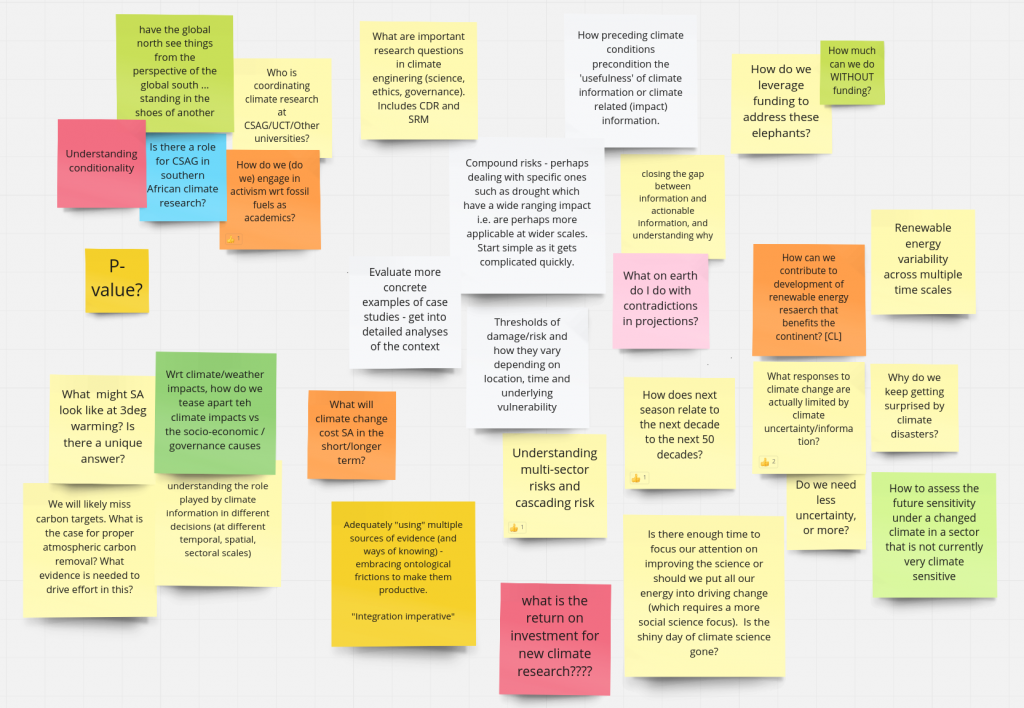“Elephants in the room” refers to those big issues that dwarf all the little nuts and bolts of research. They’re the issues that are so difficult that they tend to get avoided, or only weakly addressed. Everyone knows they’re there, but not much traction is being gained in dealing with them.
In 2023 the World Climate Research Program will hold its Open Science Conference (OSC). If one takes a quick look back at the previous OSC in 2011, you find the not unexpected spread of topics. However, the OSC 2011 language around climate change and society shows that a decade later many of the grand challenges identified still persist, even the way it was spoken about. For example, the phrase “actionable information” and “distillation” first found broad visibility at the OSC 2011, yet both remain somewhat elusive challenges a decade later.
This begs the question: are there elephants in the room that stubbornly resist moving, are there perhaps some new elephants, and why haven’t we resolved these?
With the advent of the new WCRP core project on Regional Information for Society (RIfS) (for which the draft science plan has an uncanny overlap with CSAG’s foci) it seemed timely for CSAG to take a pause and think about elephants. So we held a discussion seminar to skim what was floating on the surface of CSAG member’s brains. The question being posed is what is at the forefront of CSAG member’s thoughts, what are the issues for CSAG that are hugely challenging yet critically important?
As is common with CSAG’s stimulating, contrary-laden, and interrogative discussions, a wide spread of thoughts emerged that included “elephants” as well as issues contextual to the topic. The figure below is a Miro capture indicative of just part of the discussion.

The post-it notes are diverse, and that in itself is revealing in showing what CSAG members see as “elephants”. Some are certainly contentious, some are expected. The discussion had an embedded sense that we are in a critical time for society and, given our context in Africa, don’t have the luxury for research that will only see relevance to society long in the future.
Generally the discussion can be grouped into a few themes:
- Our interaction as scientists with the culture and context we operate in. Challenges in this space include questions on the role of activism by scientists and the tension between the world views of the global north and global south.
- Epistemic questions about what we need to know and how do we know. The question of the p-value was strongly raised: the statistical probability can often be argued as incongruous in the context of real world vulnerability.
- Controversial questioning: some hard issues that need to be put on the table. For example, is there enough time to focus our attention on improving the science or do we already know enough to focus our energies on effecting needed adaptation and mitigation. Phrased a little differently, in times of pressure how does one assess the return on scientific investment. In terms of making a difference in society, what is the value of that next costly modeling tweak? It seems the funding agency agenda’s are already reflecting this.
- Nuts and bolts issues of the core science. These range from questions around recognizing and understanding cascading risks and compound impacts. to contradictions between research findings and reaching actionable information.
- Renewable energy. This was a bit of a surprise to some, perhaps rooted in CSAG’s research threads into wind energy.
- Uncertainty … not necessarily in the formal definition, but in practical terms such as what responses and decisions are limited by uncertainty, why do we keep on getting surprised by climate disasters, or uncertainty in relating the near term predictions with long term projections.
- Funding! As a mostly soft-funded research center in the global south, for CSAG there are critical issues of survivability within a future funding landscape: centers in the global south have limited recourse to long term core funding. Conversely, what can we do with limited, especially as we are pulled into volunteer participation in the organizations such as the IPCC or WCRP and which eat up time with no remuneration.
Perhaps the biggest meta-elephant is that of conditionality. For each individual, each and every “elephant” sits in a different context which are as unique as they are diverse. This necessitates an assessment of the conditionality of any action and response, and can make generic statements of solution about as useful as they are generic.
Nonetheless, some elements/elephants can be identified irrespective of context. Issues such as achieving actionable information in a decision makers context, contradictions in science climate projections, or assessing the societal value of new science.
At the end of the day we all need to do our bit to feed, influence, and steer the elephants. For CSAG particularly its a call to keep at the forefront of our mind thinking about the added value of our choices and actions, to keep talking, debating, and exploring our role within the community of science.
